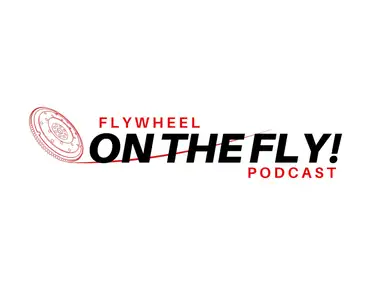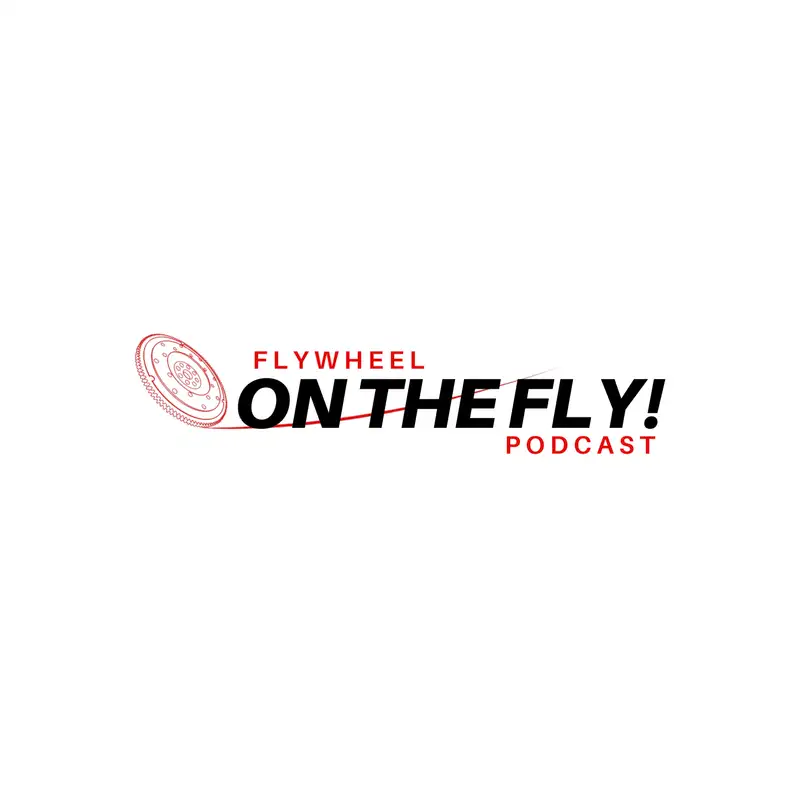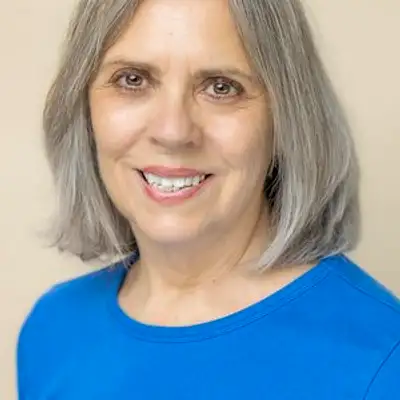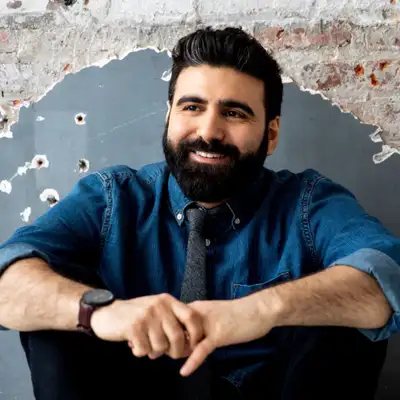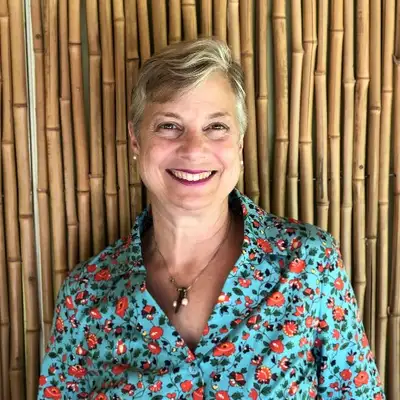You can't make community by a corporation. You can't make community by a government. You have to make community one person at a time. And I thought in that midnight moment is I started a nonprofit called Community Happens Here. Here means between you and me. That's the only place we could make community.
Joan Kaup:At Flywheel Social Enterprise Hub, we believe in the power of social enterprise to make a more sustainable and equitable community. My name is Joan Kaup. I'm the host of On the Fly. And today, I am in conversation with Ruth Ann Wolff, founder of Community Happens Here. Ruth Ann totally grasps how social enterprise is making community more equitable.
Joan Kaup:Hello, Ruth Ann, and welcome to On the Fly.
Ruth Anne Wolfe:Good morning. This is so wonderful to be here. I'm always excited anytime Joan asks me to do anything.
Joan Kaup:Well, it's always good to have a conversation with you. Thank you so much for bringing your energy and your smile and your expertise. In fact, you have quite an interesting background. How did you come to be a Flywheel founder? Tell us a little bit about that.
Ruth Anne Wolfe:Well, there's the long story and there's the short story. But the long story is that I have had many adventures in my life, and I had already been a Japanese interpreter. I had lived in Japan, worked in Japanese companies around Cincinnati. Then I became a lawyer, an event planner. I had a child, which was a wonderful thing that brought me a whole new adventure at age 40.
Ruth Anne Wolfe:So at age 45 or six or so, I found myself at a Cincinnati Public School. Cincinnati's first neighborhood Montessori elementary school, Pleasant Ridge Montessori. The most naive person you ever thought you would ever meet about public school. And I hit the most important work of my life, which was to help a neighborhood public school rise up. And in that work in which I became the cofounder or co president of the Pleasant Ridge Montessori Parent Teacher Association and the founder of the foundation that I created, I realized how important it was to create community in a place where there was nothing there.
Ruth Anne Wolfe:And we were so excited and we worked so hard and my daughter was in kindergarten and then we kept going, kept going, don't give up, don't give up for all those years, and we made it to her in sixth grade. Oh, this was great. Look at that. 250 people in the auditorium, children on the stage. Wonderful.
Ruth Anne Wolfe:And then guess what? The next year when she went to high school, poof, all of that was gone because in Cincinnati we have a very stratified society, socioeconomically and socially. And all those children and all that love that he had created just dispersed into a place that I just couldn't see it anymore. And I said, where are these children? They're still in the neighborhood but they're gone from my life. And I became very sad about that. And then one day, was downtown and I was paying for my parking at Washington Square and I got a I saw this ad that was some large, utilities company saying, we build community in Cincinnati. And I saw I got really mad. I said, no. You don't. You can't make community by a corporation. You can't make community by a government. You have to make community one person at a time. And I thought in that midnight moment when if you're a lawyer, you can do things uninadvisedly is I started a nonprofit called Community Happens Here. Here means between you and me. That's the only place we could make community. Then hopefully, it builds and builds and builds, but it has to happen here in this hyper local moment of two people talking and slowing down enough. So I got that idea and then didn't know what to do with it. My financial adviser had told us about a thing called a donor advised fund in the Greater Cincinnati Foundation. And for tax reasons, we had put a chunk of stock over there.
Ruth Anne Wolfe:And so then suddenly, had what to me seemed like a huge amount of money, like $50,000. I could do something with this. And I started taking classes with this thing I found. Bill Tucker was teaching on social enterprise. And he gave me a name for the thing I was thinking about. And eventually, it came around to be, me taking that Flywheel class.
Joan Kaup:Oh, good. Bill Tucker was one of the first executive directors of Flywheel Social Enterprise Hub. He's the one that pulled all of this together. Ruth Ann is sitting here, and she's got on a pretty little shirt that has two coffee cups on it. They're facing each other, and they have the x between them. Tell us about your coffee cups.
Ruth Anne Wolfe:So it is embroidered with a repair technique called sashiko, and they are the two cups with x because I came to understand that the way I could do this work was cup by cup. That means, in my mind, we repair the world one person and one talk and one cup at a time. And that was building on a program that I had started many years before that when Amelia was in fifth grade called Coffee Cup Entrepreneurs at Pleasant Ridge Montessori and it was to teach entrepreneurship. So in the end, these two threads have come together where I teach fourth, fifth, and sixth graders the principles of hosting and of business and of how to see their life in dream big ink terms and then keep those kids and encourage those kids to come to my now building that I own called Community Happens Here and become the hosts of this hopeful new world that we are trying to build cup by cup. Because every time a child makes a cup of coffee, asks an adult what's their name, what would they like in their coffee, and then is literally teaching the adult how to interact with humans. And, of course, we're reinforcing for the children, don't be afraid, speak your voice, tell people that this is the job you're doing, be the welcomer, and be the host. So those two threads have pulled together and, become what is now making community cup by cup.
Joan Kaup:That is excellent. Many of the founders who come to Flywheel, they have a a great concept but little experience or financial support to get it off the ground. That was not exactly the scenario for you. Like you said, you had $50,000. Oh my goodness. Can't I just change the world with that? So tell us what you were looking to gain from your time and training at Flywheel.
Ruth Anne Wolfe:As with so many things, you get more much more than you ever think you will get. I the first thing I got was to sit with a mentor. And Joan, you were amazing because you totally understood from the moment we started talking what I was trying to envision and bring into reality. That explanation is the hardest part of Community Happens Here's mission from to connect people across difference. Well, what do you mean? "What's your goal?" Why? "Who cares?" "Why is that social enterprise?" "What are you gonna do with it?" All of those things in those fifteen weeks, I really struggled because you and all the people the program is designed to make you answer those questions. Some people come in saying, how am I going to get money, investment? What I learned, one of the biggest pieces that I took away from it was that there's a big difference between running a nonprofit and running a business. And social enterprise tries to pull those together, but you don't always have the skills. One person doesn't necessarily always have the skills. And so trying to make a nonprofit into a business is a really big lift, and Bill pressured me on that. The only the other thing that I really learned was having come from a law background and a lot of school, school, school, school, I needed to get my A. Right? I wanted to get all my homework and get an A. And they kept saying to me, no. You need to get the best, the minimum viable product. The best you can do doesn't have to be an a. It needs to be, B, get as much information as you can and move forward. Figure it out as best as you can and move forward. Those were some of the great challenges and, learnings that I got at Flywheel.
Joan Kaup:Oh, that's interesting to hear. It is about momentum and keeping the momentum. And at, Flywheel, we often talk about the double bottom line. It is where passion and profit comes together. And you certainly have the passion.
Joan Kaup:But if you didn't have a little bit of the scratch, it wasn't gonna go anywhere. And now Community Happens Here is not just a concept. It is actually bricks and mortar. It is property, and you operate it as a coworking site. So you have a revenue from those professionals who use your space for workspace and those professionals interact with the young students who run the little coffee cafe in the lobby so that those young students interact with the professionals and both sides benefit from that interaction, from that community experience. Did I summarize that pretty well?
Ruth Anne Wolfe:You did. And there are some Saturdays when our, especially during tax season, when the woman who runs her tax business out of community happens here has to ask her clients to park around the corner because we have a full blown sidewalk hospitality going, and they have to sort of wend their way through maybe some Jenga or, you know, things happening like that. And that makes some people put off or they don't know how to do it. So we ask a lot of our coworkers, and we also give to our coworkers. The other side of that is that we have a sliding scale. And so, for example, we have one of our favorite coworkers, and she was vaguely trying to figure out her life. Now she has her business doing notary, and and she's a realtor. And we gave her that soft place to start. And so she becomes the welcomer because that's a very important thing that they're not just seeing my gray haired old lady face. She's an up and coming entrepreneur. And of course, as we say so often, you can't be what you can't see. This gives all the people that are working in our space and our children, the girl scouts coming in, they see that work and ideals and life and children are not all separate things. I tried to create a space where it was okay for all of those to go together. And we we have to be accommodating to each other to make a new world of work that actually works for everybody.
Joan Kaup:As long as we're talking about it, why don't you tell the listeners how they can access you, contact you, learn more about Community Happens Here?
Ruth Anne Wolfe:Well, we are, of course, on the web at www.communityhappenshere.org. And on that site, you can find out how to rent our space, how to become a coworker, what the events are that are coming up. We have large public events, and then we have smaller classes and things that happen there. We're also on Facebook at @6238, or you can search for Community Happens Here, and we're on Instagram at Community Happens Here. So we even have two TikToks.
Ruth Anne Wolfe:I'm not so good at that one. And, of course, LinkedIn. We have a LinkedIn, and I'm on that as well. So all the places that you're used to finding stuff.
Joan Kaup:Okay. Thank you. So you are less than 10 years old. Can you tell us, are you comfortable sharing with us how many employees you have, what your annual budget is now?
Ruth Anne Wolfe:That's such an interesting question because, of course, when I first started, I was– I had two interns and I had a director of development and a part time but a COO type person and all of these things. It was so much and I was so in the messy middle and I spent so much money. And since then, I have gotten way leaner and I have one amazing person that I work with. His name is Tyler Chernesky and he's the grant manager but also a person who can really help with the guiding. And he's a hundred and ten hours a month, so that's not very much.
Ruth Anne Wolfe:He's paid some. Luckily, he has another gig that he can help support himself with, and I don't get paid. Some I tried that for a little while. It didn't really work because I'd shovel the money in one end and take it out the other and then have to pay tax on. But I'm working towards that ideal where I will be able to pass it on with a space for another person who could be me. That's the the holy grail, isn't it? We have about a hundred and $70,000 a year of budget. And we I funded it. I funded this last year about 56,000 from my donor advised fund. Let's be real about that. But we're heading towards the day when we're replacing that 50,000 with other donors. We have small donors that have monthly. They give us $10 a month. We have coworkers at $100 a month. We have $350 a month businesses.
Ruth Anne Wolfe:So we have this wide range. And then we have a number of a good bit of income from other nonprofits renting our space four times. We don't do a lot of birthday parties because that is more work than income, but we do rent the space quite often for small retreats. We can do about 25 to 30 people. We can do a lovely party for that, for adults, or wine tastings and things like this. So we have that mix, and we're working towards bringing the 50,000, 60 thousand that I have been putting in, bringing that up to snuff, and then filling the bucket further so that we could have more employees. Because the more you can do, the more people you have to run things, the more you can do. But then having a payroll is very difficult, You know, tricky because as we all know, you have to come up with that money every month whether they do anything or not.
Joan Kaup:And your board, your board is engaged or is it an advisory board?
Ruth Anne Wolfe:That's a wonderful question. They are engaged as long as I ask them for help. They are always willing to step up to help. I have a long history with many as you said, Josie Dalton is on my board. She was the program director at Flywheel, she is always pressuring me to say, what is the impact measurement? We hope very much to be able to get a data for equity grant this year. And whether we get it or not, our focus this year is on gathering that data so that we can press forward with those bigger grants. As you know, the surgeon general determined that there is an actual epidemic of loneliness in America. And we are a health care organization in our community. And we need to get the health care people we've been talking more interact with health, children's hospital. Those places, we need to help understand help them understand who we are so that we can get funding around this idea that loneliness is a health care problem and that we can help alleviate it with our work.
Joan Kaup:But you do touch on something that is a challenge for any social impact enterprise, which is measurement, measurement, measurement, and what is your social impact, and how do you prove it?
Ruth Anne Wolfe:Yes. I would say that is always the challenge because one woman over five years having grown a business in our space because I didn't ask her for more than $10. Now she's busily working in our space. What number is that? Yes. That number is one, and it is a million. Right? Because the the overall impact of her is so important. And besides, she's a, mentor for her children.
Joan Kaup:It's the ripple effect with not just her, but her children and the young people she interacts with at your facility and her neighbors and friends and melting through that loneliness. So it is a it is a huge ripple effect, and it is such a challenge for you to grasp that in numbers. And for many funders and grantors, that's that's as been expected.
Ruth Anne Wolfe:Right. And it was a very it still is a big question or why I tried many times to get the, investor group to understand what I was doing and feel it was worth investing in, and I didn't succeed. It doesn't have that direct line that a angel investor is looking for. So I became my own angel investor. I bought my own house in Florida here in Cincinnati, because I feel it's important to prove the concept.
Joan Kaup:So long term, have you painted that vision yet?
Ruth Anne Wolfe:That's a everyday– 2025 is definitely a turning year for us. We've set that as the year in which we create the explanation, the clarity of of of conversation around this, and we identify where those funding sources can be. We have a challenge in that coworking looks on paper like a great way. More coworkers, more income, no problem. But the more coworkers, the more friction with the Girl Scouts and the afternoon programming and the kids coming in and out. So there's a delicate balance there. And it's not just any coworker. It has to be someone who is flexible that way. So a lot of things that are just on a piece of paper in an Excel spreadsheet don't fully calculate out. But, we are always with our eyes open to the right, person who can bridge, like Tyler and I are able to do, all kinds of people from the community, and then walk that vision forward. So we're thinking about our our explanation and then how to bring this to the attention of, say, the bigger people. We're becoming trying to become expert in loneliness and the expert in this methodology that we've created and prove to others. We have talked to a lot of other people in Cincinnati that that it is actually possible to have neighborhoods that talk to each other. I mean, that's an important thing. And a place to work that isn't super fancy and isn't super expensive and is welcoming, all of those things are part of what we're proving. And I hope and I imagine that there will be the next person who I can pass this on to that will bring the work to the next level.
Joan Kaup:Your conversation reminds me how different it is to think and expand and grow and measure a social impact enterprise versus a pure for profit business. So thank you for sharing that a little bit. I don't want to put you on the spot, but can you recite your pitch or your mission statement?
Ruth Anne Wolfe:Well, I have actually narrowed it back down further and further. So we strive to connect people across difference, and we use hospitality and art to slow people down and create a moment in which they can connect with each other.
Joan Kaup:Is there anything else you want to share with our listeners about Community Happens Here, about your background, about Flywheel?
Ruth Anne Wolfe:I would like to tell everyone that every Saturday from eleven to one, we are at 6238 Montgomery Road across from the library, and we are either physically or metaphorically on the sidewalk. We have our free coffee, tea, and hot chocolate. We have our little bit of art. We have our themes, and it is literally open to all ages of people. Every single person can stop by and have a glass of lemonade or a cup of tea and try out what it is to just be there to talk. So the most wonderful thing you can do for your community right now is to stop by between eleven and one on a Saturday and talk to somebody.
Joan Kaup:That is so nice. Thank you. You really grasp social impact and making a difference in the community in the world. So more good wishes and continued success. Thank you very much.
Ruth Anne Wolfe:Thank you, Joan, for being the mentor that helped all of this be launched.
Joan Kaup:On the Fly is produced by Joey Scarillo with music composed by Ben Hammer. Recorded at 1819 Innovation Hub in Cincinnati, Ohio, courtesy of the University of Cincinnati.
